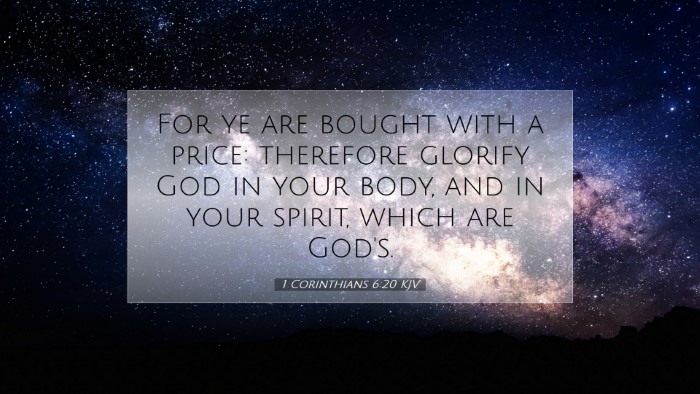1 Corinthians 6:20 - "For ye are bought with a price: therefore glorify God in your body, and in your spirit, which are God’s."
Introduction
This verse encapsulates the significance of redemption and the responsibility of believers to live in a manner that honors God. The concept of being "bought with a price" is foundational to Christian theology, underscoring themes of ownership, sacrifice, and the resulting duty to glorify God in both body and spirit.
The Price of Redemption
Matthew Henry emphasizes that the price of our redemption is the precious blood of Christ, which had been foreordained before the foundation of the world. This divine transaction highlights the immense value of each believer. When reflecting on the cost of salvation, believers are reminded of their worth in God's eyes and the seriousness of their calling.
Albert Barnes elaborates that this price indicates a shift in ownership; Christians do not belong to themselves but to God. This serves as an anchor for understanding one’s identity in Christ, as it reflects the totality of one’s being being reclaimed for God's purposes.
Implications of Being Bought
Understanding that we are bought with a price has profound implications:
- Ownership by God: Adam Clarke remarks that this ownership comes with a profound responsibility to live in accordance with God's will. Believers are called to act in ways that reflect their identity as children of God.
- Moral Responsibility: Being owned by God entails a consequence of moral obligation. The body and spirit belonging to God must be used to honor Him, indicating a holistic approach to worship and moral living.
- Freedom from Bondage: The act of being purchased signifies liberation from sin and the bondage it imposes. As confirmed by Matthew Henry, believers are no longer slaves to sin but have the freedom to serve God.
Glorifying God in Body and Spirit
The latter part of the verse encourages believers to glorify God in their body and spirit. This call extends beyond mere worship services; it encompasses how one conducts all aspects of life.
- Holistic Worship: Albert Barnes explains that glorifying God involves both our physical actions and the intentions of the heart. Every activity, from mundane tasks to significant decisions, should be infused with the goal of glorifying God.
- Integration of Faith and Life: Adam Clarke underscores that true spirituality integrates one’s physical existence with the spiritual. There should be no dichotomy between sacred and secular; every facet of life is an opportunity to honor the Creator.
- Moral Purity and Devotion: The call to glorify God in the body also implies a call to moral purity. This is crucial in the context of Corinthian culture, rife with immorality. Matthew Henry notes that the standards of holiness must guide the actions of believers, reflecting a life set apart for God.
Theological Reflections
This verse serves as a compass for theological reflection. It reminds believers of their identity in Christ and the transformational power of the gospel. Each argument that Paul presents throughout 1 Corinthians finds a practical application in this simple yet profound statement.
Albert Barnes ties the concept of glorifying God back to the overarching theme of unity and integrity within the church. When individuals honor God in their lives, they contribute to the collective witness of the community, thereby strengthening the body of Christ.
The Contextual Background
In the broader context of 1 Corinthians, this exhortation confronts the issues of division, sexual immorality, and ethical concerns within the Corinthian church. Paul’s reminder of the price paid for their freedom was aimed at instilling a sense of responsibility and community among believers.
Matthew Henry posits that this passage serves as a corrective measure against the cultural norms that influenced the Corinthian church, reminding them that their bodies are temples of the Holy Spirit, thus deserving of honor and respect.
Application for Today’s Believers
Contemporary application of this verse can be profound:
- Identity in Christ: Believers should embrace their new identity in Christ and the implications it carries into every area of life. Recognizing oneself as redeemed should inform decisions, relationships, and personal conduct.
- Ethical Living: The modern believer is challenged to evaluate the standards of morality against scripture, ensuring that personal and communal practices reflect glorification of God.
- Community and Accountability: Just as Paul addressed a community issue, modern believers are reminded of their role within the local church. Accountability to one another reinforces the commitment to living out the truth that we are bought with a price.
Conclusion
1 Corinthians 6:20 effectively encapsulates the believer's relationship with God and the implications of that relationship. The notion of being bought at a price calls for a life that is dedicated to the glorification of God in every facet of existence. This verse challenges each believer to reflect on their lives and consider how they might better honor God in both body and spirit.
As pastors, theologians, and students of the Word, there is an invitation to continually explore the depths of this truth and how it shapes the narrative of our faith and practice.


